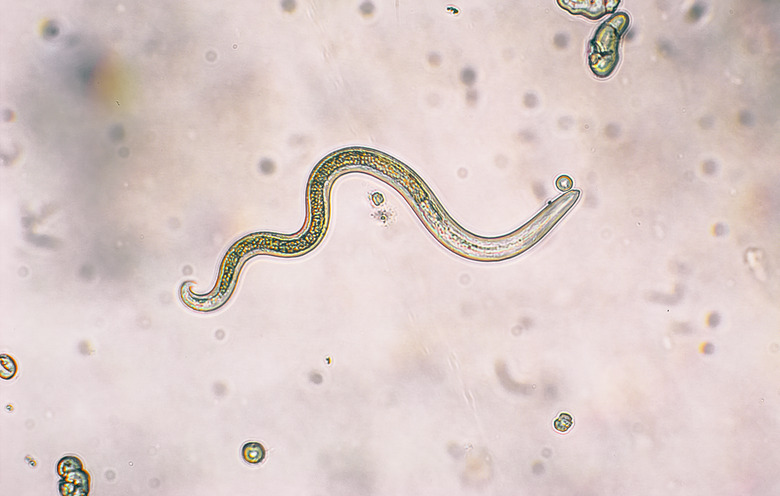Examples Of Nematodes
When you scoop up a handful of soil, the amount of life teeming within might surprise you. Tons of bacteria and invertebrates inhabit the soil, including microscopic worms known as nematodes. Though the better-known species parasitize humans, animals and plants, the vast majority of nematode species spend their time moving through soil feeding on bacteria, fungi and even other nematodes.
What Are Nematodes?
What Are Nematodes?
Exactly what are nematodes? What do nematodes look like? Well, the answer depends on the species. Researchers estimate that millions of different nematode species exist across the globe, though only about 20,000 species have been described by science. They place all the various species in the taxonomic phylum Nemata.
With few exceptions, a nematode is a microscopic, transparent worm that lives in the soil. However, you can find some non-microscopic parasitic nematodes in humans and pets.
What Do Nematodes Eat?
What Do Nematodes Eat?
Two primary types of nematodes exist: free-living nematodes and parasitic nematodes. Researchers separate the various free-living nematode species into four groups based on what they eat. These include the omnivorous nematodes that eat different prey throughout their life stages, the predatory nematodes that feed on protozoa and other nematodes, the fungal-feeder nematodes that feed on fungi and the bacterial-feeder nematodes that feed on bacteria.
Benefits of the Nematode
Benefits of the Nematode
Any individual free-living nematode actually provides numerous benefits to the ecosystem, even though you can't see it! When these microscopic organisms feed on bacteria or fungi they release nutrients into the soil that plants can utilize for survival and circulate into the rest of the food web. They also provide a food source to other creatures, such as other nematodes and invertebrates living in the soil.
Researchers have also begun utilizing beneficial nematodes for use in farming and agriculture. Numerous nematode species feed on insects or insect larvae that cause direct harm to crops, lawns and garden plants. By utilizing these beneficial nematodes, farmers and homeowners can naturally control their pest populations.
Parasitic Nematodes: Pinworms
Parasitic Nematodes: Pinworms
Pinworm infections are one of the most common infections by nematodes in humans. Children often accidentally ingest pinworm eggs and spread them throughout their home and school or daycare. This infection is caused by the nematode species Enterobius vermicularis.
Pinworm infections occur when children or their caretakers ingest the eggs of the nematode. The adult worms live within the rectum and colon, and move to the anus to lay their eggs at night. This causes itching, which results in children scratching the area and transferring the eggs to other hosts by getting them on their hands. Once on the hands, children often spread these eggs by touching their bedding, clothing and surfaces around the home or in their school, and the eggs spread to other hosts.
Parents should seek the advice of their health care provider, though pinworm infection treatment medications are available over-the-counter at pharmacies and similar stores.
Parasitic Nematodes: Hookworms
Parasitic Nematodes: Hookworms
Hookworms (members of the genus Ascaris) provide another example of nematodes in humans. Unlike the nematode that causes pinworm infection, hookworms do not infect humans through ingestion. Instead, these creatures penetrate through the skin when they come in contact with a human host.
Within humans, these parasitic nematodes live within the small intestine and spread their eggs via feces. This infection is more common in impoverished areas where human feces might end up in the soil or be used as fertilizer. The eggs within the feces hatch into larvae. These larvae infect humans when they walk barefoot or their skin otherwise comes in direct contact with the infected soil.
Most hookworm cases do not show any noticeable symptoms, though severe cases can result in blood loss. Hookworm infections must be confirmed by a doctor, who prescribes medication for the treatment of the infection.
Cite This Article
MLA
Zinni, Yasmin. "Examples Of Nematodes" sciencing.com, https://www.sciencing.com/examples-of-nematodes-12421346/. 30 September 2021.
APA
Zinni, Yasmin. (2021, September 30). Examples Of Nematodes. sciencing.com. Retrieved from https://www.sciencing.com/examples-of-nematodes-12421346/
Chicago
Zinni, Yasmin. Examples Of Nematodes last modified March 24, 2022. https://www.sciencing.com/examples-of-nematodes-12421346/
